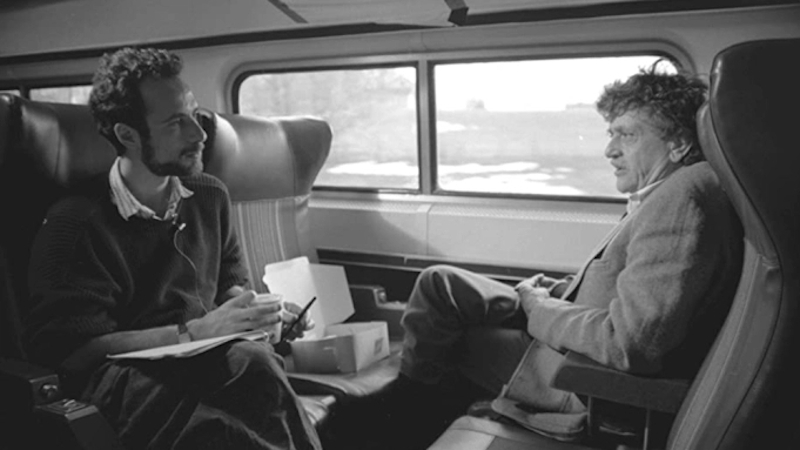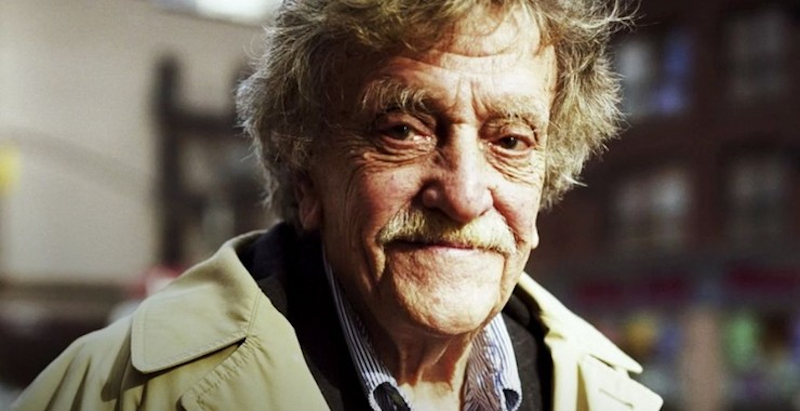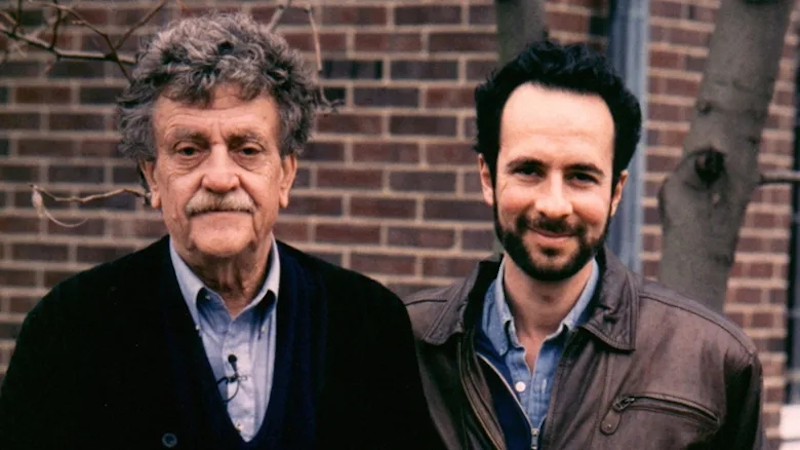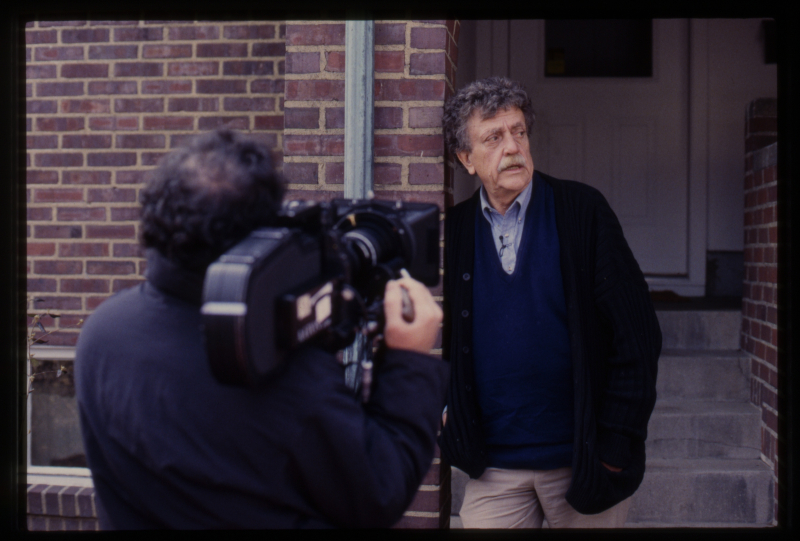Directors – Robert B. Weide, Dan Argott – 2021 – US – Cert. 15 – 127m
*****
A warm and compelling look at the life of writer Kurt Vonnegut, the influence upon him of the bombing of Dresden, and his decades-long friendship with director Weide – out in cinemas and on digital platforms from Friday, July 22nd, BFI Player Rental from Monday, August 22nd
Read my shorter review for Reform magazine.
The documentary Weide eventually made about Vonnegut took him the best part of four decades to complete. Weide opens with a statement about Vonnegut walking in the woods, feeling a tree and seeing the bombing of Dresden before it occurred. There seems no reason to doubt Vonnegut. He was unstuck in time, jumping around the years and decades. Weide first contacted him in 1982, never imagining that it would take him anything like as long to complete the film as it did. He starts looking at interviews of himself (“who wants to see a documentary in which a filmmaker appears as himself?”, he asks) – defined by where they were shot or what shirt Weide was wearing at the time.
Whatever else Vonnegut and his writing are, they are not conventional. He punctuates his verbal outpourings with little doodle drawings. In Breakfast of Champions, the first book Weide read when his teacher Valerie Stevenson set it as a reading exercise for his class, a diatribe against authority is followed by an image of an asshole, here represented as an eight-pointed asterisk. (The film similarly uses inventive little snippets of animation to punctuate the live action whole.) Soon, Weide was himself running a class teaching the author’s books to a group of students.
Weide contacted Vonnegut by letter following completion of his first documentary, on the Marx Brothers (hence the name of his production company, Whyaduck). When a friendly letter in the familiar Vonnegut handwriting from the books turned up in Weide’s mailbox, he was elated. It lead not just to shooting footage of his idol but also to a friendship between the two. The first time Weide’s camera rolls to capture Vonnegut, on a passenger train, you can feel the pair hitting it off immediately: rather than watching a professional interviewer dispassionately questioning a subject, you’re watching an obsessive fan questioning an idol. While this might affect the objectivity of the piece, it also makes it much more involving. As the friendship between the two men grows over the decades, their growing relationship draws you in.

It’s impossible to separate that friendship from Vonnegut as a cultural icon, something he already was when Weide first stumbled across the novels. While early on in the piece Weide makes it clear that he imagined he would shoot this documentary in much the same time as his Marx Brothers film – one imagines in two or three years – his difficulties completing the film function as bookends, with the final reel seeing him feeling he really ought to shape the footage into some sort of completed form after Vonnegut’s death aged 84 in 2007.
In between these two bookends, the film unpacks Vonnegut’s life more or less in chronological order. At the same time, though, as the friendship grows and Weide gets to know more and more of Vonnegut’s surviving family, other things develop. Kurt’s brother Bernard, a highly respected research scientist, found a load of old family home movies which feature prominently as Weide covers Kurt’s upbringing and childhood as much as the other periods of his life. The home movie footage reinforces the perception that Kurt’s elder sister Ali looked out for him as Weide talks about the siblings’ body language.
Kurt Vonnegut was born into a privileged Indianapolis family, his paternal great grandfather having founded the successful Vonnegut Hardware Company, only for the family to lose everything as the economy collapsed in the Great Depression. He fought in World War II but was captured at the Battle of the Bulge and interred in an underground meat-locker with many other US POWs in Dresden, a far more impressive metropolis than the Indianapolis he knew. After the bombing of Dresden, he came out to find the city razed to the ground and was then sent in by the Germans to pick up the corpses.

After the war, his brother secured him a job in the General Electric publicity department, where he observed the guilty corporate secret of automated production processes that would make employees redundant. This inspired him to write his first novel Player Piano in 1952, the publication of which meant he couldn’t very well retain his position. He hated it anyway, and after 18” high piles of rejection letters from short story magazines, he eventually started selling short stories and making far more than his GE wages. He jacked in the job, but times became hard once the US burgeoning television culture replaced magazines as the major venue for storytelling. He had instead to write novels, but they weren’t selling. His wife Jane believed in him, pushed and encouraged him and lobbied publishers. But his books barely sold and were soon out of print, and supporting his family was a problem.
All that changed when he finally wrote about Dresden in his watershed novel Slaughterhouse-Five, which fortuitously came out at the height of the Vietnam War and turned him into an overnight celebrity. He didn’t handle that too well, leaving Jane for a younger woman, a photographer, as he increasingly spent more time in New York, which eventually became home. Success also gave him writer’s block: suddenly he had a reputation to live up to which he hadn’t had before. His new-found celebrity lead to successful public talks, such as the one Weide’s camera captures at a Unitarian church. Weide comments that in line with that sect, Vonnegut wasn’t really interested in God, but much more in community. He never got over the death of his sister Alice from cancer two days after her husband unexpectedly died in a train accident in 1958.

Weide unpacks Vonnegut’s life, augmented by interviews with his two daughters who survived him. We learn how it intersected with his production of Kurt’s own play Happy Birthday, Wanda June – Weide’s wife Linda played in a local production in an attempt to get Kurt to come and visit them in 2001, a plan ultimately scuppered by the author’s unwillingness to leave New York after 9/11.
As the two men’s friendship grows, you really feel like you’re getting to know not only Vonnegut on a highly personal level but to a lesser extent Weide too. By the time you get to a clip of the terrific film adaptation of Vonnegut’s novel Mother Night (Keith Gordon, 1996, scripted and produced by Weide after Kurt gave him the rights) you feel you know him pretty well, and watching Nick Nolte play the lead – a WW2 Nazi propagandist who ends up alone in New York before being transported to Israel to face trial for war crimes – you realise the star has something of the presence of a younger Vonnegut.
In recent years, Weide has found success directing episodes of Curb Your Enthusiasm, but you can’t help but suspect that this documentary – and, for that matter, anything to do with Kurt – means a lot more to him.
You’ll learn a lot about Vonnegut the writer here – the penniless years and the celebrity years, the prosperous family who lost it all in the depression and the Dresden experience which impacted his life probably more than any other single factor. In family terms, the way he dealt with his overnight celebrity was a disaster and in later years he bemoaned the loss of extended family, something he’d experienced and to which he craved desperately, impossibly, to return. At the same time, though, his writing represents an extraordinary body of work and this film will make you want to plunge in and immerse yourself in it. For those who make the effort, this is one of the most engaging and involving films you’ll see this year.
Kurt Vonnegut: Unstuck In Time is out in cinemas and on Altitude Film digital platform in the UK from Friday, July 22nd, BFI Player Rental from Monday, August 22nd.
Trailer:
Read my shorter review for Reform magazine.
Adaptation of Vonnegut’s Mother Night (writer-producer Robert B. Weide, 1996) – review.
Never Look Away (Florian Henckel von Donnersmarck, 2018) also covers the bombing of Dresden – review.
